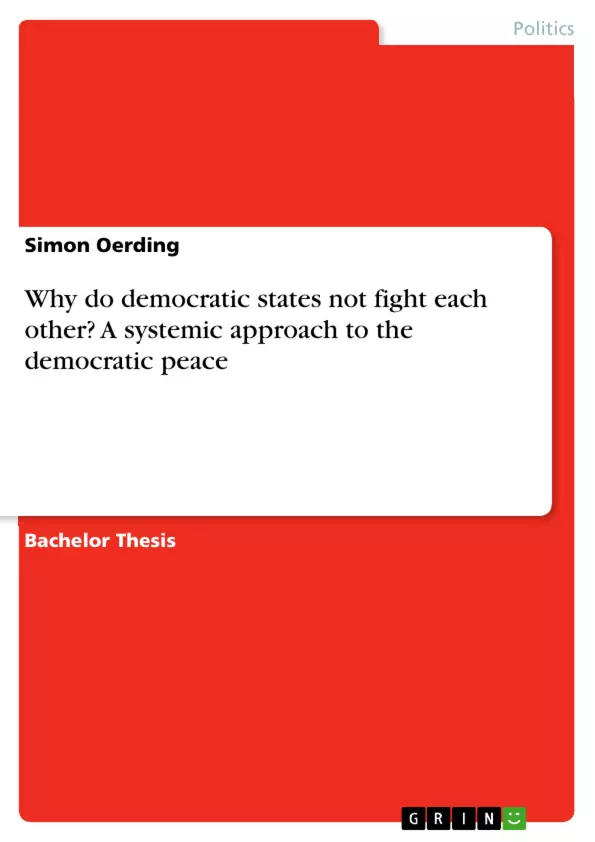Abstract
There is no regularity in international relations that is as imperturbable as the democratic peace. From the beginning of the statistical research in 1816 until today, no clear-cut case of war between two democratic states has been recorded. The democratic peace has obstinately kept the secret of its causal mechanism. No convincing theory as to its cause has been widely accepted.
It is the aim of this dissertation to provide an alternative explanation for why
democracies do not fight each other. Empirical research can only account for
correlation but not for causal mechanisms. This dissertation thus concentrates on the theoretical explanations. Scholars developed approaches to account for the democratic peace ranging from constructivist through the sociological to game-theoretical methodology. They focus on the single democratic state, the relation between two democratic states and, recently, the international system itself. This dissertation critically examines a number of such theories which vary in methodology and focus. Especially, arguments by Russett, Doyle and Müller are given attention, but, to a greater or lesser extent, they are flawed or insufficient.
At the same time, this dissertation points out a number of special characteristics of democratic states of importance. Pulling those together, an approach is proposed based on the assumption that the international system itself bears a major responsibility for the democratic peace. Supporting an approach by Hasenclever, it is argued that international institutions set up by democratic states are especially capable of mitigating conflicts and thus prevent war. Together with the special features of their member-states, such organisations account for the peaceful behaviour of democracies.[...]
Inhaltsverzeichnis (Table of Contents)
- Introduction
- Presentation of the subject
- Methodology and literature review
- Definitions
- Chapter I: The monadic level of analysis
- Empirical research on the monadic level
- The three main axioms and the rationalist approach
- Structural constraints
- Normative constraints
- Synthetic approaches
- Concluding words
- Chapter II: The dyadic level of analysis
- Empirical research on the dyadic level
- The shared democratic institutions and the credibility of signals
- The shared democratic culture
- A peace of deterrence
- Concluding words
- Chapter III: The systemic level of analysis
- Alternative approaches to the systemic analysis
- International Organisations
- The international organisation of democratic states prevents war
- Concluding words
Zielsetzung und Themenschwerpunkte (Objectives and Key Themes)
This dissertation aims to provide an alternative explanation for the democratic peace – the observation that democratic states rarely, if ever, fight each other. It critiques existing theories focusing on individual states and their relationships, arguing that these are insufficient. Instead, it proposes a systemic approach.
- The inadequacy of existing monadic and dyadic explanations for the democratic peace.
- Analysis of theoretical approaches to the democratic peace, including those of Russett, Doyle, and Müller.
- Examination of the role of structural and normative constraints on democratic state behavior.
- The importance of shared democratic institutions and culture in maintaining peace.
- The systemic role of international organizations in mitigating conflict between democracies.
Zusammenfassung der Kapitel (Chapter Summaries)
Chapter I: The monadic level of analysis examines empirical research and theoretical frameworks focusing on individual democratic states. It analyzes the rationalist approach, structural and normative constraints, and synthetic approaches to understanding why democracies tend not to fight each other.
Chapter II: The dyadic level of analysis shifts focus to the relationships between pairs of democratic states. It explores the role of shared democratic institutions, culture, and deterrence mechanisms in preventing conflict.
Chapter III: The systemic level of analysis explores alternative perspectives on the international system's contribution to the democratic peace. It specifically investigates the role of international organizations established by democratic states in conflict mitigation and war prevention.
Schlüsselwörter (Keywords)
Democratic peace, international relations, war, democracy, international organizations, rational choice theory, constructivism, systemic analysis, monadic level, dyadic level, deterrence, norms, institutions.
Frequently Asked Questions
What is the "Democratic Peace" theory?
It is the observation that clear-cut cases of war between two democratic states are virtually non-existent in modern history since 1816.
What are normative constraints in democracies?
These are internal democratic values and norms that favor peaceful conflict resolution and discourage violent aggression against other democracies.
How do international organizations contribute to peace?
International organizations established by democracies help mitigate conflicts through institutionalized cooperation and credible signaling.
What is the difference between monadic and dyadic levels of analysis?
The monadic level looks at individual democratic states, while the dyadic level focuses on the specific relationship between two democracies.
Why are institutional constraints important for preventing war?
Democratic institutions like parliaments and free media slow down the process of going to war, making the state's actions more predictable and transparent.
- Citar trabajo
- BA Simon Oerding (Autor), 2006, Why do democratic states not fight each other? A systemic approach to the democratic peace, Múnich, GRIN Verlag, https://www.grin.com/document/124905



